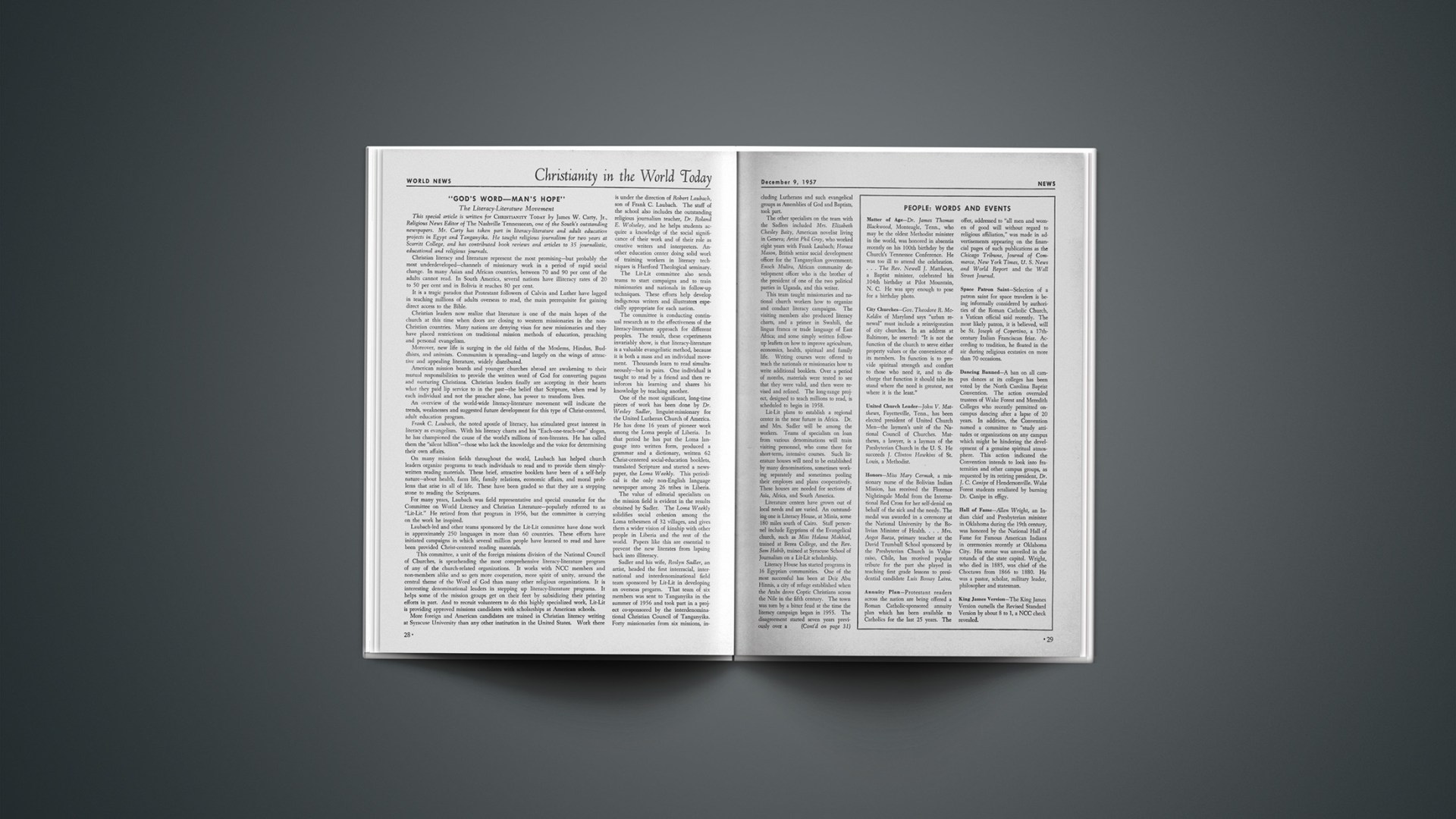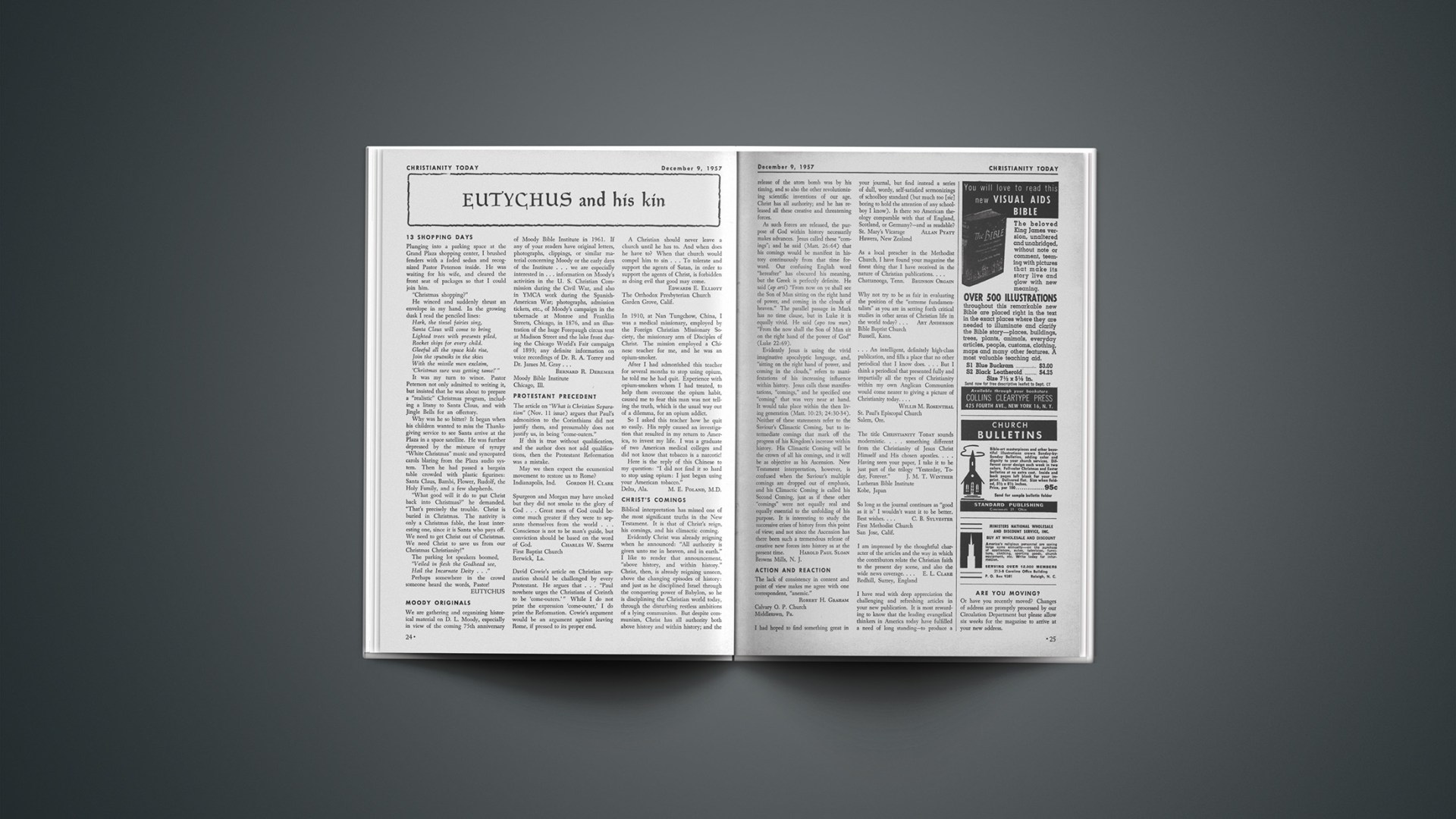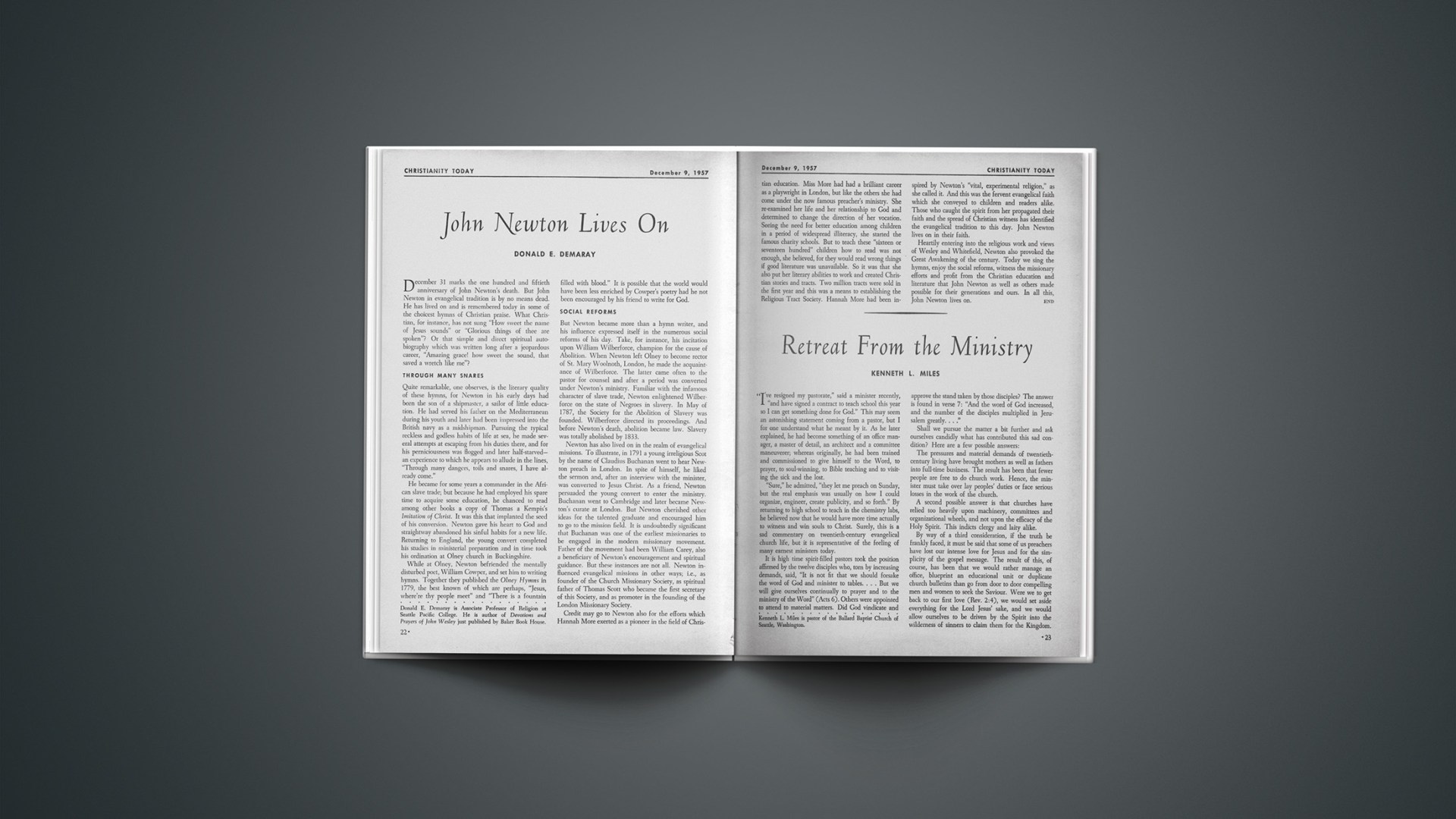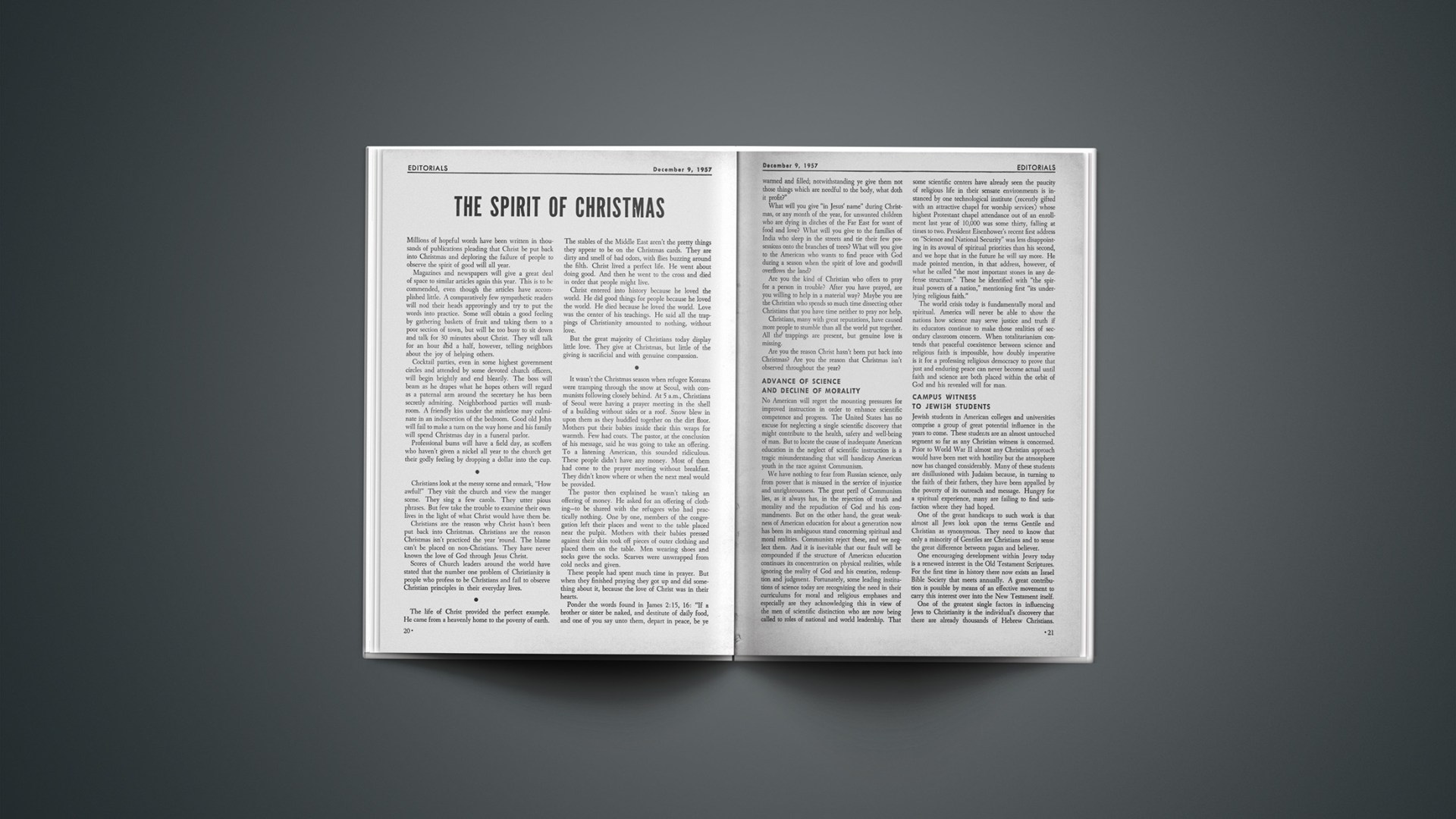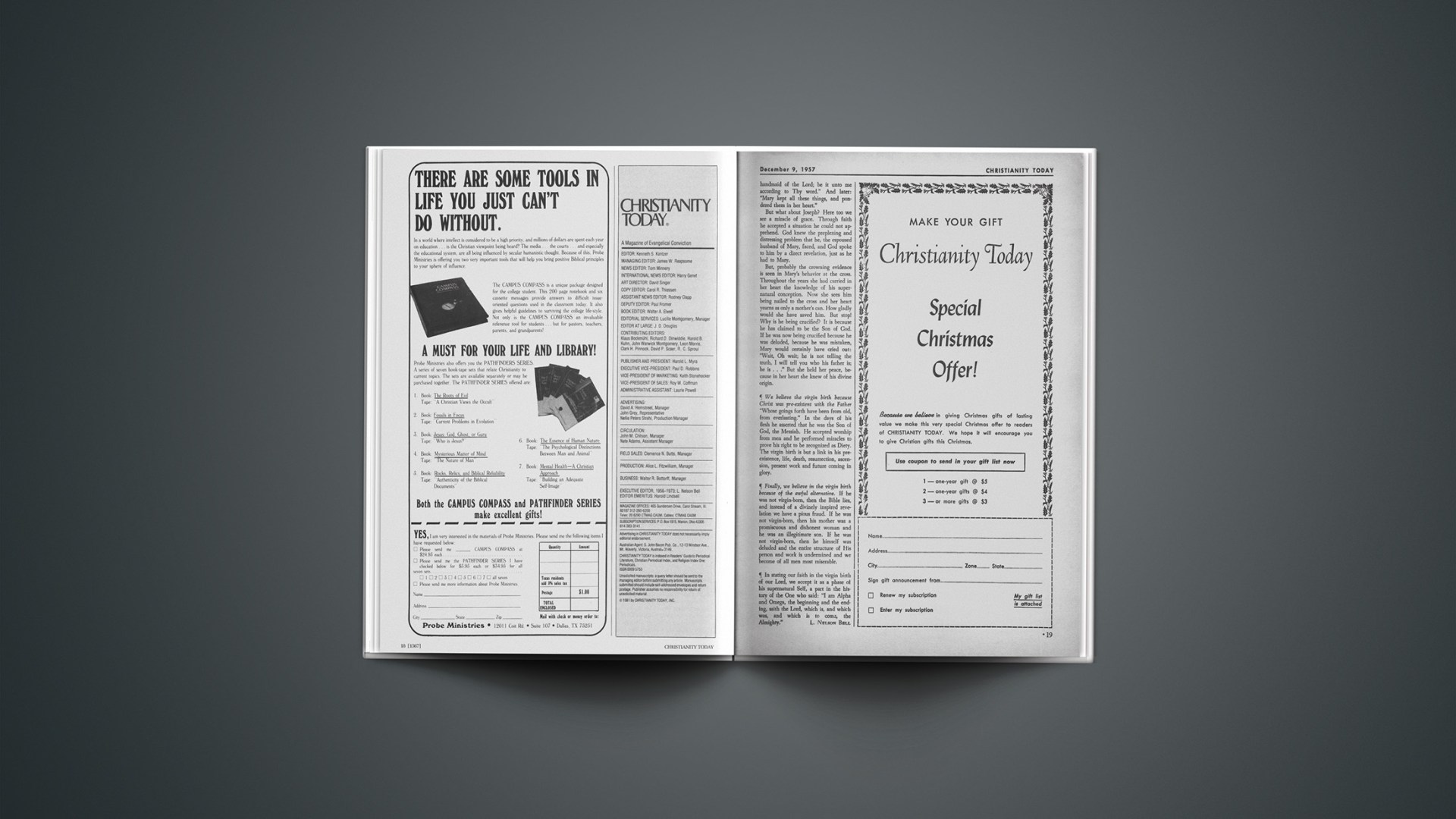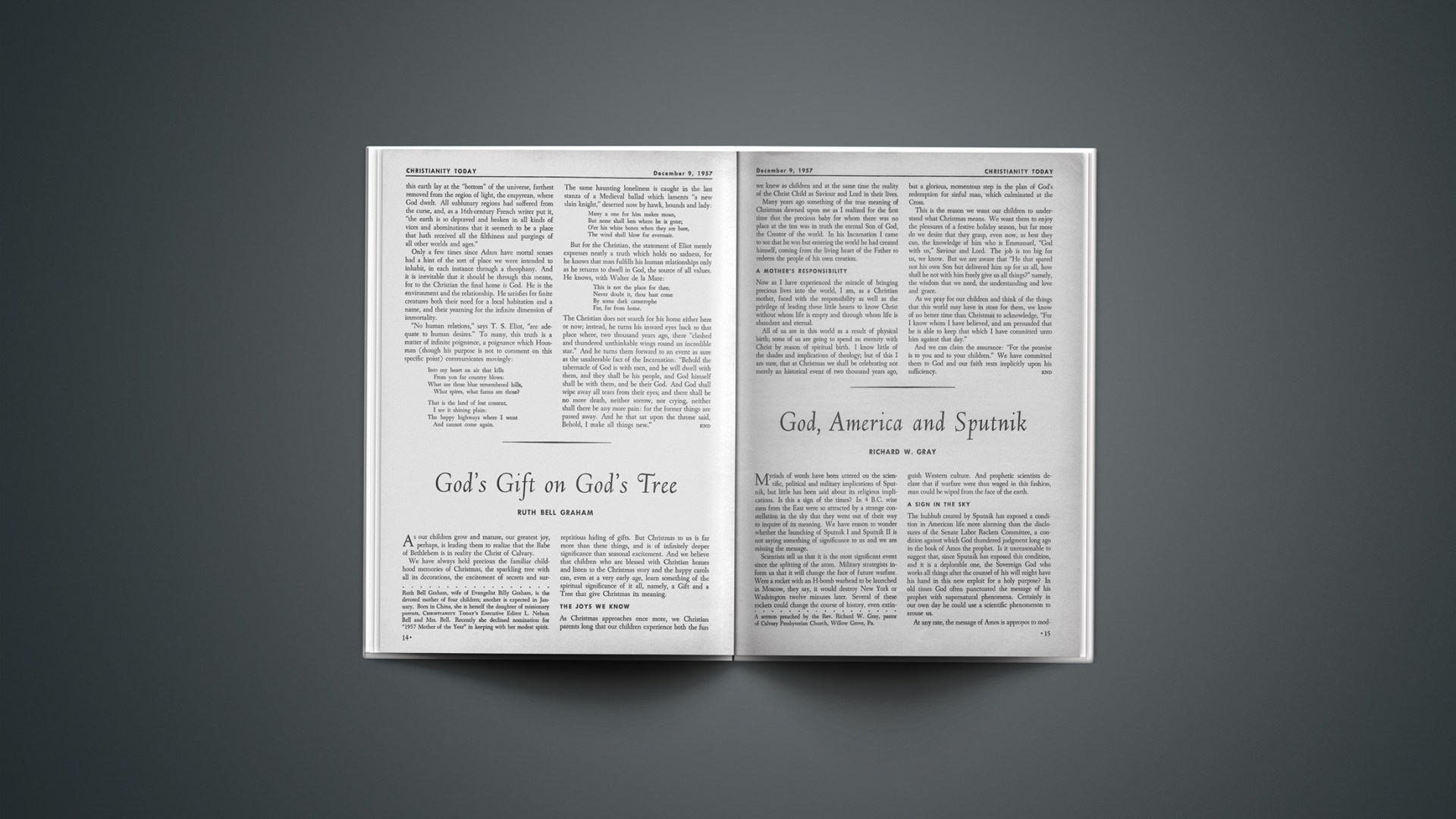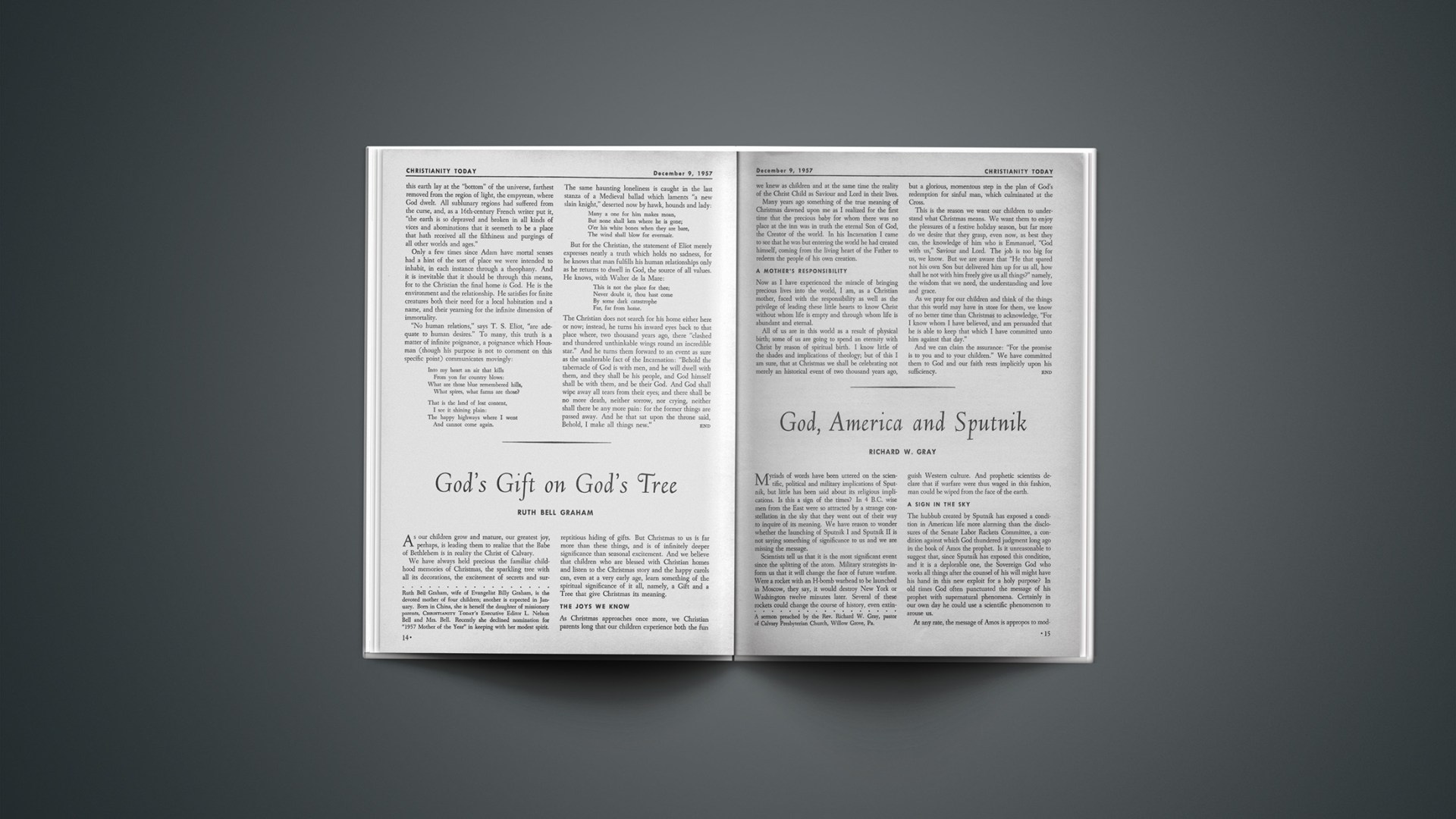Christianity in the World Today
The Literacy-Literature Movement
This special article is written forCHRISTIANITY TODAYby James W. Carty, Jr., Religious News Editor of The Nashville Tennesseean, one of the South’s outstanding newspapers. Mr. Carty has taken part in literacy-literature and adult education projects in Egypt and Tanganyika. He taught religious journalism for two years at Scarritt College, and has contributed book reviews and articles to 35 journalistic, educational and religious journals.
Christian literacy and literature represent the most promising—but probably the most underdeveloped—channels of missionary work in a period of rapid social change. In many Asian and African countries, between 70 and 90 per cent of the adults cannot read. In South America, several nations have illiteracy rates of 20 to 50 per cent and in Bolivia it reaches 80 per cent.
It is a tragic paradox that Protestant followers of Calvin and Luther have lagged in teaching millions of adults overseas to read, the main prerequisite for gaining direct access to the Bible.
Christian leaders now realize that literature is one of the main hopes of the church at this time when doors are closing to western missionaries in the non-Christian countries. Many nations are denying visas for new missionaries and they have placed restrictions on traditional mission methods of education, preaching and personal evangelism.
Moreover, new life is surging in the old faiths of the Moslems, Hindus, Buddhists, and animists. Communism is spreading—and largely on the wings of attractive and appealing literature, widely distributed.
American mission boards and younger churches abroad are awakening to their mutual responsibilities to provide the written word of God for converting pagans and nurturing Christians. Christian leaders finally are accepting in their hearts what they paid lip service to in the past—the belief that Scripture, when read by each individual and not the preacher alone, has power to transform lives.
An overview of the world-wide literacy-literature movement will indicate the trends, weaknesses and suggested future development for this type of Christ-centered, adult education program.
Frank C. Laubach, the noted apostle of literacy, has stimulated great interest in literacy as evangelism. With his literacy charts and his “Each-one-teach-one” slogan, he has championed the cause of the world’s millions of non-literates. He has called them the “silent billion”—those who lack the knowledge and the voice for determining their own affairs.
On many mission fields throughout the world, Laubach has helped church leaders organize programs to teach individuals to read and to provide them simply-written reading materials. These brief, attractive booklets have been of a self-help nature—about health, farm life, family relations, economic affairs, and moral problems that arise in all of life. These have been graded so that they are a stepping stone to reading the Scriptures.
For many years, Laubach was field representative and special counselor for the Committee on World Literacy and Christian Literature—popularly referred to as “Lit-Lit.” He retired from that program in 1956, but the committee is carrying on the work he inspired.
Laubach-led and other teams sponsored by the Lit-Lit committee have done work in approximately 250 languages in more than 60 countries. These efforts have initiated campaigns in which several million people have learned to read and have been provided Christ-centered reading materials.
This committee, a unit of the foreign missions division of the National Council of Churches, is spearheading the most comprehensive literacy-literature program of any of the church-related organizations. It works with NCC members and non-members alike and so gets more cooperation, more spirit of unity, around the central theme of the Word of God than many other religious organizations. It is interesting denominational leaders in stepping up literacy-literature programs. It helps some of the mission groups get on their feet by subsidizing their printing efforts in part. And to recruit volunteers to do this highly specialized work, Lit-Lit is providing approved missions candidates with scholarships at American schools.
More foreign and American candidates are trained in Christian literacy writing at Syracuse University than any other institution in the United States. Work there is under the direction of Robert Laubach, son of Frank C. Laubach. The staff of the school also includes the outstanding religious journalism teacher, Dr. Roland E. Wolseley, and he helps students acquire a knowledge of the social significance of their work and of their role as creative writers and interpreters. Another education center doing solid work of training workers in literacy techniques is Hartford Theological seminary.
The Lit-Lit committee also sends teams to start campaigns and to train missionaries and nationals in follow-up techniques. These efforts help develop indigenous writers and illustrators especially appropriate for each nation.
The committee is conducting continual research as to the effectiveness of the literacy-literature approach for different peoples. The result, these experiments invariably show, is that literacy-literature is a valuable evangelistic method, because it is both a mass and an individual movement. Thousands learn to read simultaneously—but in pairs. One individual is taught to read by a friend and then reinforces his learning and shares his knowledge by teaching another.
One of the most significant, long-time pieces of work has been done by Dr. Wesley Sadler, linguist-missionary for the United Lutheran Church of America. He has done 16 years of pioneer work among the Loma people of Liberia. In that period he has put the Loma language into written form, produced a grammar and a dictionary, written 62 Christ-centered social-education booklets, translated Scripture and started a newspaper, the Loma Weekly. This periodical is the only non-English language newspaper among 26 tribes in Liberia.
The value of editorial specialists on the mission field is evident in the results obtained by Sadler. The Loma Weekly solidifies social cohesion among the Loma tribesmen of 32 villages, and gives them a wider vision of kinship with other people in Liberia and the rest of the world. Papers like this are essential to prevent the new literates from lapsing back into illiteracy.
Sadler and his wife, Roslyn Sadler, an artist, headed the first interracial, international and interdenominational field team sponsored by Lit-Lit in developing an overseas progarm. That team of six members was sent to Tanganyika in the summer of 1956 and took part in a project co-sponsored by the interdenominational Christian Council of Tanganyika. Forty missionaries from six missions, including Lutherans and such evangelical groups as Assemblies of God and Baptists, took part.
The other specialists on the team with the Sadlers included Mrs. Elizabeth Chesley Baity, American novelist living in Geneva; Artist Phil Gray, who worked eight years with Frank Laubach; Horace Mason, British senior social development officer for the Tanganyikan government; Enoch Mulira, African community development officer who is the brother of the president of one of the two political parties in Uganda, and this writer.
This team taught missionaries and national church workers how to organize and conduct literacy campaigns. The visiting members also produced literacy charts, and a primer in Swahili, the lingua franca or trade language of East Africa; and some simply written follow-up leaflets on how to improve agriculture, economics, health, spiritual and family life. Writing courses were offered to teach the nationals or missionaries how to write additional booklets. Over a period of months, materials were tested to see that they were valid, and then were revised and refined. The long-range project, designed to teach millions to read, is scheduled to begin in 1958.
Lit-Lit plans to establish a regional center in the near future in Africa. Dr. and Mrs. Sadler will be among the workers. Teams of specialists on loan from various denominations will train visiting personnel, who come there for short-term, intensive courses. Such literature houses will need to be established by many denominations, sometimes working separately and sometimes pooling their employes and plans cooperatively. These houses are needed for sections of Asia, Africa, and South America.
Literature centers have grown out of local needs and are varied. An outstanding one is Literacy House, at Minia, some 180 miles south of Cairo. Staff personnel include Egyptians of the Evangelical church, such as Miss Halana Makhiel, trained at Berea College, and the Rev. Sam Habib, trained at Syracuse School of Journalism on a Lit-Lit scholarship.
Literacy House has started programs in 16 Egyptian communities. One of the most successful has been at Deir Abu Hinnis, a city of refuge established when the Arabs drove Coptic Christians across the Nile in the fifth century. The town was tom by a bitter feud at the time the literacy campaign began in 1955. The disagreement started seven years previously over a boundary dispute between elders of the two churches, the Coptic and Evangelical, and spread to political, conomic and social affairs. But an 18-month literacy campaign increased adult literates from 362 to 2000; reconciled man to man and men to God; turned the village from one of hate to one of love. The group organized a democratic village planning committee, started a farmers’ cooperative, a health clinic, a school, two library-recreation rooms, and 18 Bible study groups.
The late Margaret Runbeck, noted American author, went to Egypt and helped nationals prepare the booklets. She taught pastors of the Evangelical church (established by missionaries of the United Presbyterian Church) to write social-education materials, directly in Arabic.
Lit-Lit’s purpose is not to publish books, but to get them published. An ideal book cannot be written in London or New York, but has to be prepared on the field, to suit the thought and cultural patterns and needs of the people. Field work must be a training experience for those who will become the literature leaders of the younger churches.
In India, mission presses have set up a service council so that members can share in technical equipment and skills. The Board of Christian Literature of the National Christian Council of India published 87 books in 11 languages in 1956. Fourteen theological textbooks were done, one book on Billy Graham in Tamil and Telegu vernacular languages, and a biography of Graham in the Malayalam vernacular. Trunks are used to pass collections of books from village to village.
Support of organizations like Lit-Lit is needed, because the younger churches cannot always afford the printing expenses. Christian churches do not have the financial support of the governments; in Ceylon, for example, much Buddhist literature is published with government support.
In Hong Kong, a great amount of Christian literature is published by the Council for Christian Literature for Overseas Chinese. It is sold widely outside Red China in countries where Chinese now live.
Japan is the literacy exception in the East, since 98 per cent of adults are literate. Christian books are published by 14 different presses. Stress in 1956 was on Luther and the great Christian classics, as it can be where the people have literacy and a traditional culture. Many Japanese—sometimes 9,000 a year, and all literate—are moving to Latin America. Their habits of reading may influence Latin Americans.
The evangelical groups are a major hope for building Christian democracies in South America. Catholics hunger for direct possession of the Bible. The Wycliffe translators have done outstanding work in translating Scriptures into Indian languages. Spanish literacy work is ready to move forward in churches and seminaries. A forward push in this area is needed because a new generation of illiterates has come into being. In Honduras, for example, an estimated 200,000 children are not in school because of lack of teachers and buildings. The school program of the evangelical missions and churches are important to the culture, economic and spiritual welfare of that country.
In an effort to help the churches coordinate their efforts, Dr. F. J. Rex, education secretary for Lit-Lit, recently held several meetings with church leaders in Latin America. In Mexico, for example, he met with 22 representatives of evangelical churches, missions and other agencies. That session was arranged through the help of Dr. Gonzalo Baez-Camargo, literature secretary for the committee on cooperation in Latin America, and Dr. William Wonderley, American Bible society representative in Mexico.
Lit-Lit officials have headquarters in New York City, but supplement team trips to the field by going themselves to advise personnel on the spot. Dr. Floyd Shacklock, executive secretary, went to Africa in 1956 and 1957 to help missionaries and nationals plan work. Both Dr. Shacklock and Dr. Rex are able men who have had long backgrounds of actual work experience in the field.
Some 39 denominational boards share in supporting Lit-Lit’s financial program. Even more communions take part in the work on the field. In 1943, when Lit-Lit was formed, there were 19 member denominations. It was made up of the Committee on Christian Literature of the International Missionary Council and the World Literacy Committee of the Foreign Missions Conference. Later that year, the American Christian Literature Society for Muslims merged with Lit-Lit.
Through encouragement of Lit-Lit, there is a trend toward use of specialists by the denominations. In the past, literacy-literature was only a part-time added duty for missionaries with other responsibilities. Now there is an increasing number of full-time people working on problems of writing materials, some trained before their missionary work began, others trained on furlough.
The goal of each denomination should be a literature secretary for each country where it has missions work.
Jesus asked, “Have ye not read?” (Luke 6:3). His own stress on the centrality of Scripture demands that Christians take a new look to see if they themselves are giving priority to the written Word of God.
Sixth Elo Conference
Sixth annual conference of Evangelical Literature Overseas is being held this week (Dec. 9–12) in Lincoln, Nebraska, with daily sessions and workshops on editorial, publishing and distribution problems. Among the speakers are Harold J. Kregel, missionary recently returned from Spain, David B. Woodward and J. Oswald Sanders of the Overseas Missionary Fellowship, and R. M. Searing, recently of Colombia. Experts in several branches of mission literature work will appear in panel discussions to deal with practical problems aired by the delegates.
ELO is an independent organization designed to implement mission literature in many areas of the world, has its headquarters in Wheaton, Illinois. Executive Secretary Harold B. Street has spent several months this past year setting up literature councils in Africa and the Middle East, and Director Kenneth N. Taylor recently returned from a three-month trip around the world in the same cause.
People: Words And Events
Matter of Age—Dr. James Thomas Blackwood, Monteagle, Tenn., who may be the oldest Methodist minister in the world, was honored in absentia recently on his 100th birthday by the Church’s Tennessee Conference. He was too ill to attend the celebration.… The Rev. Newell J. Matthews, a Baptist minister, celebrated his 104th birthday at Pilot Mountain, N. C. He was spry enough to pose for a birthday photo.
City Churches—Gov. Theodore R. McKeldin of Maryland says “urban renewal” must include a reinvigoration of city churches. In an address at Baltimore, he asserted: “It is not the function of the church to serve either property values or the convenience of its members. Its function is to provide spiritual strength and comfort to those who need it, and to discharge that function it should take its stand where the need is greatest, not where it is the least.”
United Church Leader—John V. Matthews, Fayetteville, Tenn., has been elected president of United Church Men—the laymen’s unit of the National Council of Churches. Matthews, a lawyer, is a layman of the Presbyterian Church in the U. S. He succeeds J. Clinton Hawkins of St. Louis, a Methodist.
Honors—Miss Mary Cermak, a missionary nurse of the Bolivian Indian Mission, has received the Florence Nightingale Medal from the International Red Cross for her self-denial on behalf of the sick and the needy. The medal was awarded in a ceremony at the National University by the Bolivian Minister of Health.… Mrs. Aogot Baeza, primary teacher at the David Trumbull School sponsored by the Presbyterian Church in Valparaiso, Chile, has received popular tribute for the part she played in teaching first grade lessons to presidential candidate Luis Bossay Leiva.
Annuity Plan—Protestant readers across the nation are being offered a Roman Catholic-sponsored annuity plan which has been available to Catholics for the last 25 years. The offer, addressed to “all men and women of good will without regard to religious affiliation,” was made in advertisements appearing on the financial pages of such publications as the Chicago Tribune, Journal of Commerce, New York Times, U. S. News and World Report and the Wall Street Journal.
Space Patron Saint—Selection of a patron saint for space travelers is being informally considered by authorities of the Roman Catholic Church, a Vatican official said recently. The most likely patron, it is believed, will be St. Joseph of Copertino, a 17th-century Italian Franciscan friar. According to tradition, he floated in the air during religious ecstasies on more than 70 occasions.
Dancing Banned—A ban on all campus dances at its colleges has been voted by the North Carolina Baptist Convention. The action overruled trustees of Wake Forest and Meredith Colleges who recently permitted on-campus dancing after a lapse of 20 years. In addition, the Convention named a committee to “study attitudes or organizations on any campus which might be hindering the development of a genuine spiritual atmosphere. This action indicated the Convention intends to look into fraternities and other campus groups, as requested by its retiring president, Dr. J. C. Canipe of Hendersonville. Wake Forest students retaliated by burning Dr. Canipe in effigy.
Hall of Fame—Allen Wright, an Indian chief and Presbyterian minister in Oklahoma during the 19th century, was honored by the National Hall of Fame for Famous American Indians in ceremonies recently at Oklahoma City. His statue was unveiled in the rotunda of the state capitol. Wright, who died in 1885, was chief of the Choctaws from 1866 to 1880. He was a pastor, scholar, military leader, philosopher and statesman.
King James Version—The King James Version outsells the Revised Standard Version by about 8 to 1, a NCC check revealed.
Edwards Catches Up
Millions of Americans peeked into the so-called private life of Dr. Billy Graham recently when the television cameras of “This Is Your Life” made an excellent effort to accomplish an impossibility—packing the story into 30 minutes, with commercials.
Ralph Edwards, noted TV personality, had been trying to catch up with the fast-moving evangelist for several years and finally made it when the temporarily-crippled Dr. Graham limped into the Beverly Hilton Hotel to address several hundred members of the Hollywood film colony.
Memorable events and people appeared briefly on the screen, depicting the unprecedented rise of a North Carolina farm boy, who had more talent for milking cows than influencing people, to a position of world spiritual leadership.
To keep the record straight, Dr. Graham had to interrupt Edwards near the end. He said: “This is God’s doing. The praise, honor and glory must go to him.”
It is impossible to gauge the total effect of such a program. As is so often the case, however, God seemed to begin his greatest work after the cameras had stopped turning.
Top actors and actresses, who themselves have held audiences spellbound, gave rapt attention as the evangelist began his scheduled address on Bible answers to the problems of the world. Almost an hour later they were still sitting on the mental edge of their seats.
Dr. Graham mentioned the great importance of sputniks and muttniks now circling the globe. He quoted Prime Minister Nehru of India as saying, “the world is now living on the brink of disaster.” He quoted a German scientist as saying it is now possible to depopulate the earth in 24 hours.
He warned that it is now impossible for anyone to live with any sense of security, outside of Jesus Christ.
“America and the world have no hope,” he said, “unless they repent of sin and return to God.”
Then, concentrating his thrust on the individual, Dr. Graham told his listeners about their great need of God and of the force for good they might be in a world that looked to them for entertainment.
He urged them to take a stand for Christ, no matter how unpopular it might be. He explained the Bible’s conditions—upon which the stand might be made—personal repentance, faith in Christ as the Son of God, surrender of will to God’s will, daily Bible reading and prayer, witnessing for Christ and active participation in a church where the Bible is preached.
The address in many respects was similar to those he had given throughout America, Great Britain, Europe and Asia. The Hollywood locale didn’t make any difference.
Dr. Graham has stated on many occasions: “People basically are the same. All have sinned. All need God.”
The evangelist and members of his team were in California primarily to meet with ministers of the San Francisco area, where a six-week crusade will begin April 27 in the Cow Palace. An estimated 1,400 ministers turned out for for the meeting to hear a discussion of plans for the mammoth undertaking.
Observers described the occasion as one of the largest and most significant gathering of ministers ever held in the San Francisco area.
‘Breather’ Asked
Rep. Brooks Hays (D.-Ark.) has proposed that a “breather period” be given the South in the matter of school integration. He said this would “permit a re-evaluation of the U. S. Supreme Court’s school integration order.”
The Congressman, who is president of the Southern Baptist Convention, made his proposal in an address to the Arkansas Chamber of Commerce-Associates Industries.
Mr. Hays, in another talk, told the annual meeting of the Arkansas Baptist Convention that the solution to the Little Rock integration crisis will come as a result of “God’s law.”
“We will not be disturbed by the great conflicts between state and federal laws,” he said. “We will seek a solution in the realm of spiritual values because it is God’s law that will bring peace.”
In his address to the business group, Mr. Hays said the “breather” plan is to “invite our northern friends to consider a suspension of judicial procedures for a while to give us an opportunity to re-evaluate and re-examine this most difficult question.”
He admitted it would be a difficult problem to obtain a suspension of procedures but said this was necessary to prevent a repetition of the Little Rock integration controversy and preserve the nation’s morale and unity.
Mr. Hays said he would seek such a suspension by using “friendly persuasion” on his northern colleagues in Congress.
The Arkansas lawmaker said he respected the Supreme Court and warned that “we lose something precious” by flouting its decisions. But he said the court can be wrong, and in areas of national policy it is the duty of Congress to correct the tribunal’s mistakes. He intimated that he considered the racial question a matter of national policy.
Mr. Hays referred to the Little Rock situation when he discussed the growing interdependence of the world.
“What happens in America is known in the heart of Africa tomorrow,” he said. “The recent experience in our city makes that truth known to us.”
He expressed the hope that Baptists would be able to exert a moral influence throughout the world to insure peace.
“We disappoint God when we allow national loyalties to involve us in war,” he asserted.
Jeroboam’S Temple
A biblical archaeologist has announced that he knows the location of the ancient Temple of Jeroboam but can’t reach it.
Dr. James L. Kelso said the temple is buried under the southern edge of Bethel, 12 miles from Jerusalem, but “homes are so close together there that any excavation work is impossible.”
Dr. Kelso is professor of Biblical Archeology and Semitics at Pittsburgh-Xenia Theological Seminary. He left last June on his third attempt to uncover the temple that Jeroboam I built as a rival place of worship to Solomon’s temple in Jerusalem.
Bethel was the chief sanctuary of the Northern Kingdom of Judea following the secession of 10 tribes under Jeroboam, the rebel leader. Jerusalem was the capital of the Southern Kingdom of Judea after the breakup of the original 12-tribe nation.
In previous explorations Dr. Kelso unearthed a giant stone wall surrounding Bethel. He also discovered portions of the winter palace of King Herod the Great near Jericho. Herod was the ruler of Judea when Christ was born and ordered the infamous Slaughter of the Innocents.
His next expeditions will be to Herodium, a few miles from Bethlehem, and Pella, near the Sea of Galilee.

